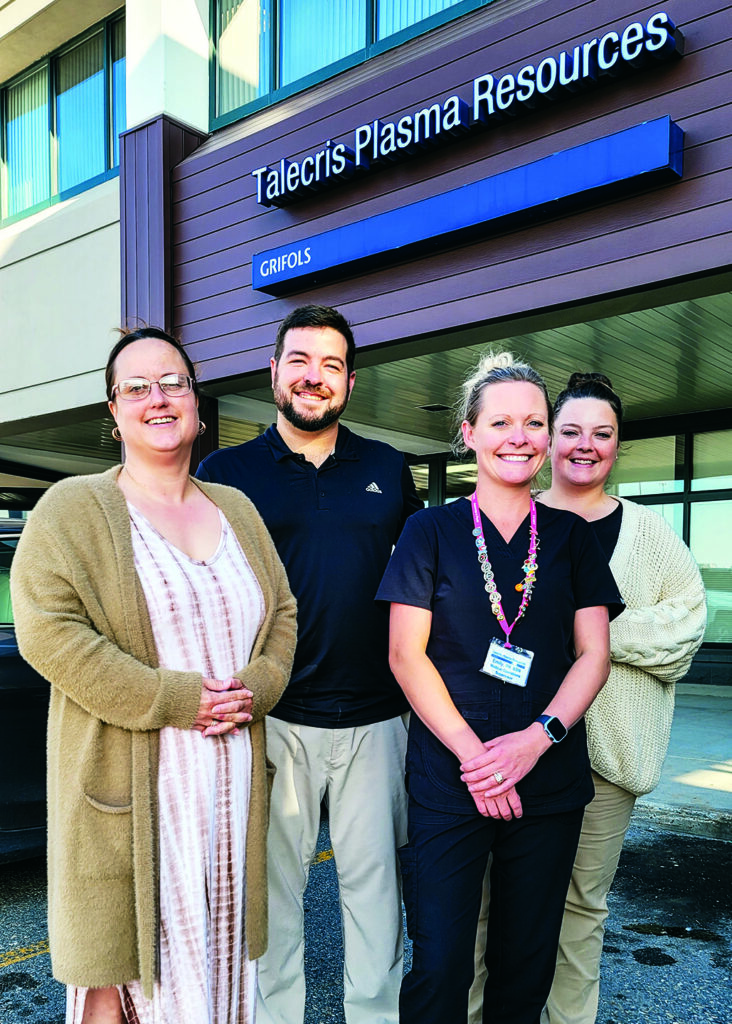moorhead business news

Talecris Plasma Services collects plasma from donors for medical and pharmaceutical purposes. From left: Donor service rep Sabrina Dawson Soulis; assistant manager Alex Davis; medical operations supervisor Emily Meyers; and training coordinator Anna Croucher. Not shown: manager Ruth Wirtz. (Photo/Nancy Hanson.)
Nancy Edmonds Hanson
When you donate whole blood, you’re helping to save lives. The same goes for donating plasma, the liquid component of what runs in your arteries and veins … but there’s an added incentive: Donors, who can come in for the procedure as often as twice a week, are reimbursed for their time and willingness to help others.
Talecris Plasma Resources is one of two Moorhead centers that are always on the lookout for plasma donors. Like BioLife, the other plasma center, its parent company is an enormous operation spanning the continent and beyond. “Grifols, our parent corporation, has about 400 centers across the U.S., Canada, Europe and Egypt,” donor service representative Sabrina Dawson Soulis reports. It’s the largest network of donation centers in the world. The corporation has 23,000 employees across its operations, about 50 of them here in Moorhead, with more being added this month.
Sabrina says that though Talecris has been here for 14 years, people are more familiar with donations of whole blood. Vitalant’s blood drives and announcements when the supply is low bring in public-spirited men and women whose gifts are inspired by the opportunity to do good for others.
Donating plasma – the liquid portion of blood minus the red and white blood cells and platelets – is another avenue for helping humanity, but it differs from giving blood in several major ways. One is that donors who are hooked up to the plasmapheresis machines that collect the substance get most of it back. The equipment strips out blood cells and platelets and returns them to the body.
Of the plasma collected, 93% is water. The remaining 7% includes vital proteins such as albumin, gamma globulin and anti-hemophilic factor as well as a small amount of salts, sugars, fats, hormones and vitamins. The plasma is used to treat a long list of rare conditions, including hemophilia and other clotting disorders; Rh deficiency in pregnant mothers; and victims of trauma, burns and shock, among others. It is also used in the manufacture of medicines for multiple sclerosis, immunodeficiency and other diagnoses.
Because of that, recovery is far quicker — only 48 hours, compared to weeks when whole blood is removed. In plasmapheresis, only the liquid is collected. Those critical red and white cells don’t have to be regenerated by the body. That means donors can come into the Talecris center at 800 Holiday Drive as often as twice a week.
The third difference, Sabrina says, can be huge for the $1,300 person who donate every week: Regular donors can make a substantial amount of money. Talecris donors had received $2.4 million from January through the end of July. By year’s end, that number will reach $3.6 million.
“If you were a new donor in August and came in twice a week, you could receive $1,010 for the month,” she says. In addition to base payments, a variety of incentives and special offers boost the earning potential. “Donating plasma can be a lifeline. Regular donations can be a big part of the picture for anyone from college students and retirees to people who are struggling to support a family despite rising grocery and gas prices.”
Plasma donors can include anyone from 18 to the last day of their 69th year, she says, providing they pass a physical on their first visit. That includes a medical history, details of prescribed medications and their general health condition. “If you pass everything, you get to donate,” she says.
The center operates seven sections of six beds each. It employs a phlebotomist (a specialist in drawing blood) for every six patients. The beds are generally busy throughout the day; appointments, which can be made online, are recommended.
“It’s like a family,” Sabrina says, “both our staff and our donors. I know most of those who come in regularly by name. She has worked with the company for most of the past six years, working her way up to phlebotomist and into management – a benefit, she says, of a company that provides tuition reimbursement and a variety of professional fields along with other training and benefits.
Talecris schedules donors from 5 a.m. to 8 p.m. Monday through Friday and from 7 a.m. to 3 p.m. Sundays.
“We’re proud to serve our community in several ways,” she points out. “We provide an income source to those who need it … at the same time that we are saving lives.”


